Theater
Queer theater pros wow in varied productions
Michael Urie in ‘Hamlet,’ Signature’s ‘Passion’ among ’18 highlights
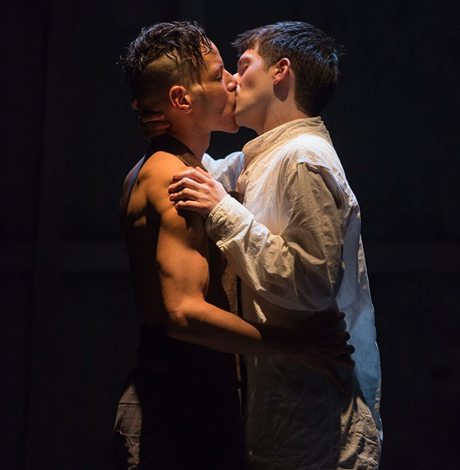
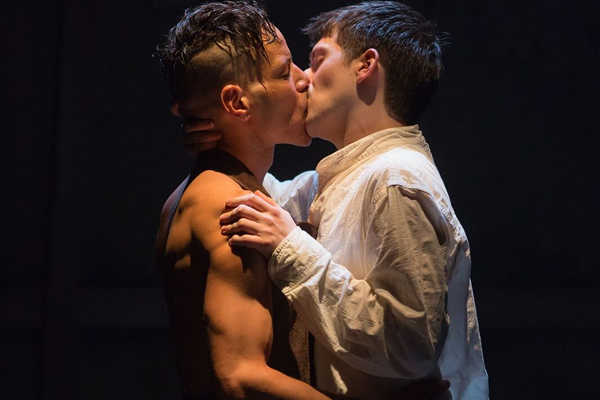
Jon Hudson Odom (left) and James Crichton in ‘Botticelli in the Fire.’ (Photo by Scott Suchman)
Throughout 2018, some LGBT actors made marvelous star turns while others stalwartly succeeded at supporting roles in myriad Washington-area productions. Less visible, but equally important, were the many out directors, designers and playwrights without whom nothing much happens.
The always terrific Jon Hudson Odom, a longtime Washington actor who decamped for Chicago several months ago, marvelously tackled the title role in Nathan Alan Davis’ “Nat Turner in Jerusalem” at Forum Theatre in the spring. Staged by out director José Carrasquillo, the exquisitely rendered piece concerns the last hours in the life of prisoner Turner, a condemned slave and educated minister who led the famed 1831 slave rebellion in Southampton County, Va.
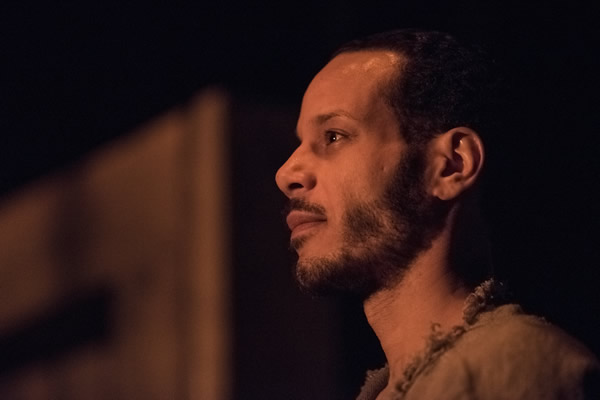
Jon Hudson Odom in ‘Nat Turner in Jerusalem.’ (Photo by Teresa Castracane Photography; courtesy Form)
Odom was equally memorable as another title character in Woolly Mammoth Theatre’s striking staging of Jordan Tannahill’s “Botticelli in the Fire.” Odom fearlessly portrayed legendary painter in this carnal and campy reimagining of historical gay figures in Renaissance Italy.
Michael Kevin Darnell truly shone in Bosco Brasil’s “New Guidelines for Peaceful Times,” an intense two hander that made its American premiere at Spooky Action Theater in the fall. In a brilliantly nuanced performance, Darnell played Clausewitz, an immigrant from war-torn Poland, eager to charm his way into post-World War II Brazil.
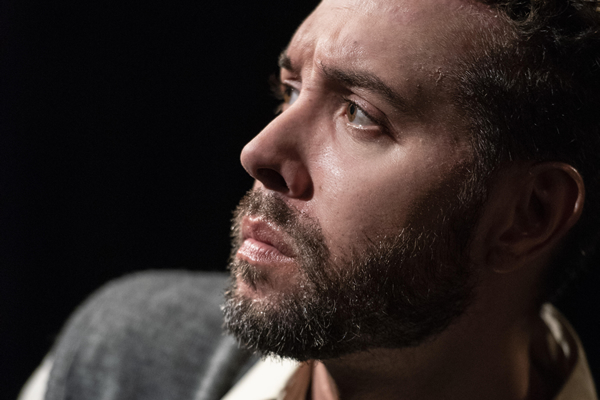
Michael Kevin Darnall in ‘New Guielines for Peaceful Times’ at Spooky Action Theatre. (Photo by Teresa Castracane)
Karen Harman’s “Roz and Ray” mines the early years of HIV/AIDS in America, focusing primarily on the tragic experience of hemophiliacs and big pharma’s sometimes nefarious involvement. In Theater J’s compelling production, Tom Story played Ray from Texas, the smart but uneducated, bisexual father of hemophilic young twin sons. Ray becomes involved with Roz (Susan Rome), a dedicated pediatric hematologist/oncologist. In playing Ray, Story told the Blade he was definitely treading on new territory and liked it.
Round House Theatre’s summer production “The Legend of Georgia McBride” was an LGBT collaboration. Penned by Matthew Lopez, directed by Tom Story and choreographed by Matthew Gardiner, the sweet story of a failed Elvis impersonator unwittingly turned solvent drag star, featured a talented, hardworking cast that included Desi Bing who played boozy drag performer Rexy and Rick Hammerly as self-proclaimed grande dame of drag, Miss Tracy Mills.
In Woolly Mammoth’s production of out playwright Branden Jacob-Jenkins dramedy “Gloria,” the reliably first-rate Justin Weaks displayed his versatility playing several characters including a quiet, Harvard-educated intern shot dead by a crazy coworker. And more recently at Round House Theatre, Weaks played Citizen Barlow, a man in spiritual turmoil who doesn’t realize the vastness of his adventure, in “Gem of the Ocean,” August Wilson’s ninth play in his Pittsburgh-set 10-play cycle examining African-American life in the United States during the 20th century.
Out playwright Ken Urban’s “The Remains,” an exploration of the internal and external pressures surrounding same-sex marriage, made its world premiere in a terrific production at Studio Theatre last winter. The comedy about the tragedy of love starred Maulik Pancholy (“Weeds,” “30 Rock,” “Star Trek: Discovery”) as rising literature professor Kevin and Glenn Fitzgerald (“Dirty Sexy Money,” “Six Feet Under”) as his lawyer husband Theo.
And, again in 2018, out actors took on the classics.
Early in 2018, Michael Urie, a familiar face from TV sitcoms and Broadway, played the coveted lead in the Shakespeare Theatre Company’s “Hamlet.” Set in a sleekly designed police state, the production was staged by the company’s out artistic director Michael Kahn. While Urie received reviews ranging from madcap to commanding, he relayed in an interview with the Blade that he was very satisfied with the production. Would he assay Hamlet again in the future? “Never say never,” he said.
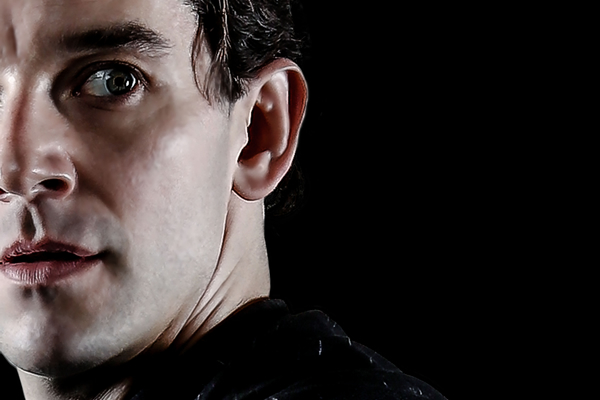
Michael Urie in ‘Hamlet.’ (Photo by Tony Powell; courtesy STC)
Holly Twyford was a standout as the obsessively driven Constance in Folger Theatre’s “King John,” one of Shakespeare’s rarely produced works. Smartly staged by Aaron Posner, the quick-paced, thrilling account of court and familial struggles surrounding the English crown, left one wondering why this early history play isn’t mounted more often.
Out directors soared in 2018.
At Shakespeare Theatre Company, Alan Paul staged one of the year’s best — Shakespeare’s “The Comedy Errors” set in 1960s Athens. A fabulous cast included out actors Tom Story playing an effete jeweler and hilarious Sarah Marshall as a sham exorcist.
At Signature Theatre, director Matthew Gardiner charmed audiences with a delightful production of Todd Almond’s musical “Girlfriend,” a gay love story about two very different teenage boys whose unlikely friendship blossoms into a full-blown romance.
Gardiner also helmed Signature’s production of Stephen Sondheim’s “Passion,” a musical about Giorgio, a handsome young officer, who rather inexplicably falls in love with his commanding officer’s sickly cousin. The exquisitely staged piece featured handsome out Broadway actor Claybourne Elder and Natascia Diaz who’s likely to garner awards for her Fosca.
And Gardiner closed the year with “Billy Elliot The Musical” (also at Signature). Set in Northern England during the 1980s miners’ strike, it’s the story of a working-class boy who’s a natural at ballet.
The year has proved a fine time for up-and-coming, local LGBT actors to show their stuff. Jade Jones played Senior Duke in Keegan Theatre’s “As You Like It,” a pop/rock musical take on the Bard’s romantic comedy by New York singer/songwriter Shaina Taub. In Signature’s “Girlfriend,” Jimmy Mavrikes was terrific as Will, an unfocussed but clever gay outcast who lands the closeted popular jock. And Ben Gunderson was a standout as the tap-dancing purser in Arena Stage’s hit production of Cole Porter’s “Anything Goes.”
Theater
José Zayas brings ‘The House of Bernarda Alba’ to GALA Hispanic Theatre
Gay Spanish playwright Federico García Lorca wrote masterpiece before 1936 execution

‘The House of Bernarda Alba’
Through March 1
GALA Hispanic Theatre
3333 14th St., N.W.
$27-$52
Galatheatre.org
In Federico García Lorca’s “The House of Bernarda Alba,” now at GALA Hispanic Theatre in Columbia Heights, an impossibly oppressive domestic situation serves, in short, as an allegory for the repressive, patriarchal, and fascist atmosphere of 1930s Spain
The gay playwright completed his final and arguably best work in 1936, just months before he was executed by a right-wing firing squad. “Bernarda Alba” is set in the same year, sometime during a hot summer in rural Andalusia, the heart of “España profunda” (the deep Spain), where traditions are deeply rooted and mores seldom challenged.
At Bernarda’s house, the atmosphere, already stifling, is about to get worse.
On the day of her second husband’s funeral, Bernarda Alba (superbly played by Luz Nicolás), a sixtyish woman accustomed to calling the shots, gathers her five unmarried daughters (ages ranging from 20 to 39) and matter-of-factly explain what’s to happen next.
She says, “Through the eight years of mourning not a breeze shall enter this house. Consider the doors and windows as sealed with bricks. That’s how it was in my father’s house and my grandfather’s. Meanwhile, you can embroider your trousseaux.”
It’s not an altogether sunny plan. While Angustias (María del Mar Rodríguez), Bernarda’s daughter from her first marriage and heiress to a fortune, is betrothed to a much younger catch, Pepe el Romano, who never appears on stage, the remaining four stand little chance of finding suitable matches. Not only are they dowry-less, but no men, eligible or otherwise, are admitted into their mother’s house.
Lorca is a literary hero known for his mastery of both lyrical poetry and visceral drama; still, “Bernarda Alba’s” plotline might suit a telenovela. Despotic mother heads a house of adult daughters. Said daughters are churning with passions and jealousies. When sneaky Martirio (Giselle Gonzáles) steals the photo of Angustias’s fiancé all heck kicks off. Lots of infighting and high drama ensue. There’s even a batty grandmother (Alicia Kaplan) in the wings for bleak comic relief.
At GALA, the modern classic is lovingly staged by José Zayas. The New York-based out director has assembled a committed cast and creative team who’ve manifested an extraordinarily timely 90-minute production performed in Spanish with English subtitles easily ready seen on multiple screens.
In Lorca’s stage directions, he describes the set as an inner room in Bernarda’s house; it’s bright white with thick walls. At GALA, scenic designer Grisele Gonzáles continues the one-color theme with bright red walls and floor and closed doors. There are no props.
In the airless room, women sit on straight back chairs sewing. They think of men, still. Two are fixated on their oldest siter’s hunky betrothed. Only Magdelena (Anna Malavé), the one sister who truly mourns their dead father, has given up on marriage entirely.
The severity of the place is alleviated by men’s distant voices, Koki Lortkipanidze’s original music, movement (stir crazy sisters scratching walls), and even a precisely executed beatdown choreographed by Lorraine Ressegger-Slone.
In a short yet telling scene, Bernarda’s youngest daughter Adela (María Coral) proves she will serve as the rebellion to Bernarda’s dictatorship. Reluctant to mourn, Adela admires her reflection. She has traded her black togs for a seafoam green party dress. It’s a dreamily lit moment (compliments of lighting designer Hailey Laroe.)
But there’s no mistaking who’s in charge. Dressed in unflattering widow weeds, her face locked in a disapproving sneer, Bernarda rules with an iron fist; and despite ramrod posture, she uses a cane (though mostly as a weapon during one of her frequent rages.)
Bernarda’s countenance softens only when sharing a bit of gossip with Poncia, her longtime servant convincingly played by Evelyn Rosario Vega.
Nicolás has appeared in “Bernarda Alba” before, first as daughter Martirio in Madrid, and recently as the mother in an English language production at Carnegie Melon University in Pittsburgh. And now in D.C. where her Bernarda is dictatorial, prone to violence, and scarily pro-patriarchy.
Words and phrases echo throughout Lorca’s play, all likely to signal a tightening oppression: “mourning,” “my house,” “honor,” and finally “silence.”
As a queer artist sympathetic to left wing causes, Lorca knew of what he wrote. He understood the provinces, the dangers of tyranny, and the dimming of democracy. Early in Spain’s Civil War, Lorca was dragged to the the woods and murdered by Franco’s thugs. Presumably buried in a mass grave, his remains have never been found.
Theater
Magic is happening for Round House’s out stage manager
Carrie Edick talks long hours, intricacies of ‘Nothing Up My Sleeve’

‘Nothing Up My Sleeve’
Through March 15
Round House Theatre
4545 East-West Highway
Bethesda, Md. 20814
Tickets start at $50
Roundhousetheatre.org
Magic is happening for out stage manager Carrie Edick.
Working on Round House Theatre’s production of “Nothing Up My Sleeve,” Edick quickly learned the ways of magicians, their tricks, and all about the code of honor among those who are privy to their secrets.
The trick-filled, one-man show starring master illusionist Dendy and staged by celebrated director Aaron Posner, is part exciting magic act and part deeply personal journey. The new work promises “captivating storytelling, audience interaction, jaw-dropping tricks, and mind-bending surprises.”
Early in rehearsals, there was talk of signing a non-disclosure agreement (NDA) for production assistants. It didn’t happen, and it wasn’t necessary, explains Edick, 26. “By not having an NDA, Dendy shows a lot of trust in us, and that makes me want to keep the secrets even more.
“Magic is Dendy’s livelihood. He’s sharing a lot and trusting a lot; in return we do the best we can to support him and a large part of that includes keeping his secrets.”
As a production assistant (think assistant stage manager), Edick strives to make things move as smoothly as possible. While she acknowledges perfection is impossible and theater is about storytelling, her pursuit of exactness involves countless checklists and triple checks, again and again. Six day weeks and long hours are common. Stage managers are the first to arrive and last to leave.
This season has been a lot about learning, adds Edick. With “The Inheritance” at Round House (a 22-week long contract), she learned how to do a show in rep which meant changing from Part One to Part Two very quickly; “In Clay” at Signature Theatre introduced her to pottery; and now with “Nothing Up My Sleeve,” she’s undergoing a crash course in magic.
She compares her career to a never-ending education: “Stage managers possess a broad skillset and that makes us that much more malleable and ready to attack the next project. With some productions it hurts my heart a little bit to let it go, but usually I’m ready for something new.”
For Edick, theater is community. (Growing up in Maryland, she was a shy kid whose parents signed her up for theater classes.) Now that community is the DMV theater scene and she considers Round House her artistic home. It’s where she works in different capacities, and it’s the venue in which she and actor/playwright Olivia Luzquinos chose to be married in 2024.
Edick came out in middle school around the time of her bat mitzvah. It’s also around the same time she began stage managing. Throughout high school she was the resident stage manager for student productions, and also successfully participated in county and statewide stage management competitions which led to a scholarship at the University of Maryland, Baltimore County (UMBC) where she focused on technical theater studies.
Edick has always been clear about what she wants. At an early age she mapped out a theater trajectory. Her first professional gig was “Tuesdays with Morrie” at Theatre J in 2021. She’s worked consistently ever since.
Stage managing pays the bills but her resume also includes directing and intimacy choreography (a creative and technical process for creating physical and emotional intimacy on stage). She names Pulitzer Prize winning lesbian playwright Paula Vogel among her favorite artists, and places intimacy choreographing Vogel’s “How I learned to Drive” high on the artistic bucket list.
“To me that play is heightened art that has to do with a lot of triggering content that can be made very beautiful while being built to make you feel uncomfortable; it’s what I love about theater.”
For now, “Nothing Up My Sleeve” keeps Edick more than busy: “For one magic trick, we have to set up 100 needles.”
Ultimately, she says “For stage managers, the show should stay the same each night. What changes are audiences and the energy they bring.”
Theater
‘Octet’ explores the depths of digital addiction
Habits not easily shaken in Studio Theatre chamber musical

‘Octet’
Through Feb. 26
Studio Theatre
1501 14th Street, N.W.
Tickets start at $55
Studiotheatre.org
David Malloy’s “Octet” delves deep into the depths of digital addiction.
Featuring a person ensemble, this extraordinary a capella chamber musical explores the lives of recovering internet addicts whose lives have been devastated by digital dependency; sharing what’s happened and how things have changed.
Dressed in casual street clothes, the “Friends of Saul” trickle into a church all-purpose room, check their cell phones in a basket, put away the bingo tables, and arrange folding chairs into a circle. Some may stop by a side table offering cookies, tea, and coffee before taking a seat.
The show opens with “The Forest,” a haunting hymn harking back to the good old days of an analog existence before glowing screens, incessant pings and texts.
“The forest was beautiful/ My head was clean and clear/Alone without fear/ The forest was safe/ I danced like a beautiful fool / One time some time.”
Mimicking an actual step meeting, there’s a preamble. And then the honest sharing begins, complete with accounts of sober time and slips.
Eager to share, Jessica (Chelsea Williams) painfully recalls being cancelled after the video of her public meltdown went viral. Henry (Angelo Harrington II) is a gay gamer with a Candy Crush problem. Toby (Adrian Joyce) a nihilist who needs to stay off the internet sings “So anyway/ I’m doing good/ Mostly/ Limiting my time/ Mostly.”
The group’s unseen founder Saul is absent, per usual.
In his stead Paula, a welcoming woman played with quiet compassion by Tracy Lynn Olivera, leads. She and her husband no longer connect. They bring screens to bed. In a love-lost ballad, she explains: “We don’t sleep well/ My husband I/ Our circadian rhythms corrupted/ By the sallow blue glow of a screen/ Sucking souls and melatonin/ All of my dreams have been stolen.”
After too much time spent arguing with strangers on the internet, Marvin, a brainy young father played by David Toshiro Crane, encounters the voice of a God.
Ed (Jimmy Kieffer) deals with a porn addiction. Karly (Ana Marcu) avoids dating apps, a compulsion compared to her mother’s addiction to slot machines.
Malloy, who not only wrote the music but also the smart lyrics, book, and inventive vocal arrangements, brilliantly joins isolation with live harmony. It’s really something.
And helmed by David Muse, “Octet” is a precisely, quietly, yet powerfully staged production, featuring a topnotch cast who (when not taking their moment in the spotlight) use their voices to make sounds and act as a sort of Greek chorus. Mostly on stage throughout all of the 100-minute one act, they demonstrate impressive stamina and concentration.
An immersive production, “Octet” invites audience members to feel a part of the meeting. Studio’s Shargai Theatre is configured, for the first, in the round. And like the characters, patrons must also unplug. Everyone is required to have their phones locked in a small pouch (that only ushers are able to open and close), so be prepared for a wee bit of separation anxiety.
At the end of the meeting, the group surrenders somnambulantly. They know they are powerless against internet addiction. But group newbie Velma (Amelia Aguilar) isn’t entirely convinced. She remembers the good tech times.
In a bittersweet moment, she shares of an online friendship with “a girl in Sainte Marie / Just like me.”
Habits aren’t easily shaken.




















